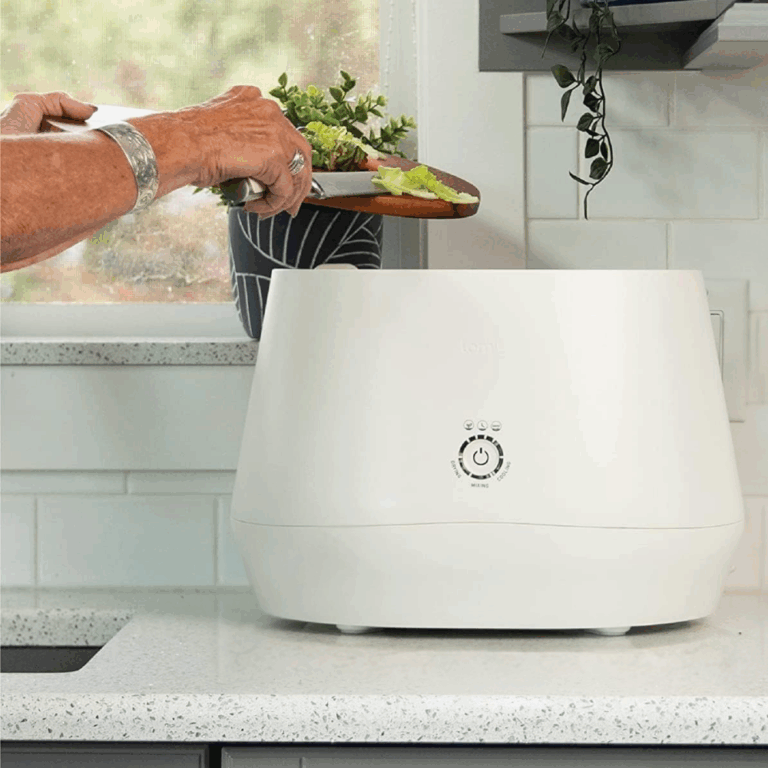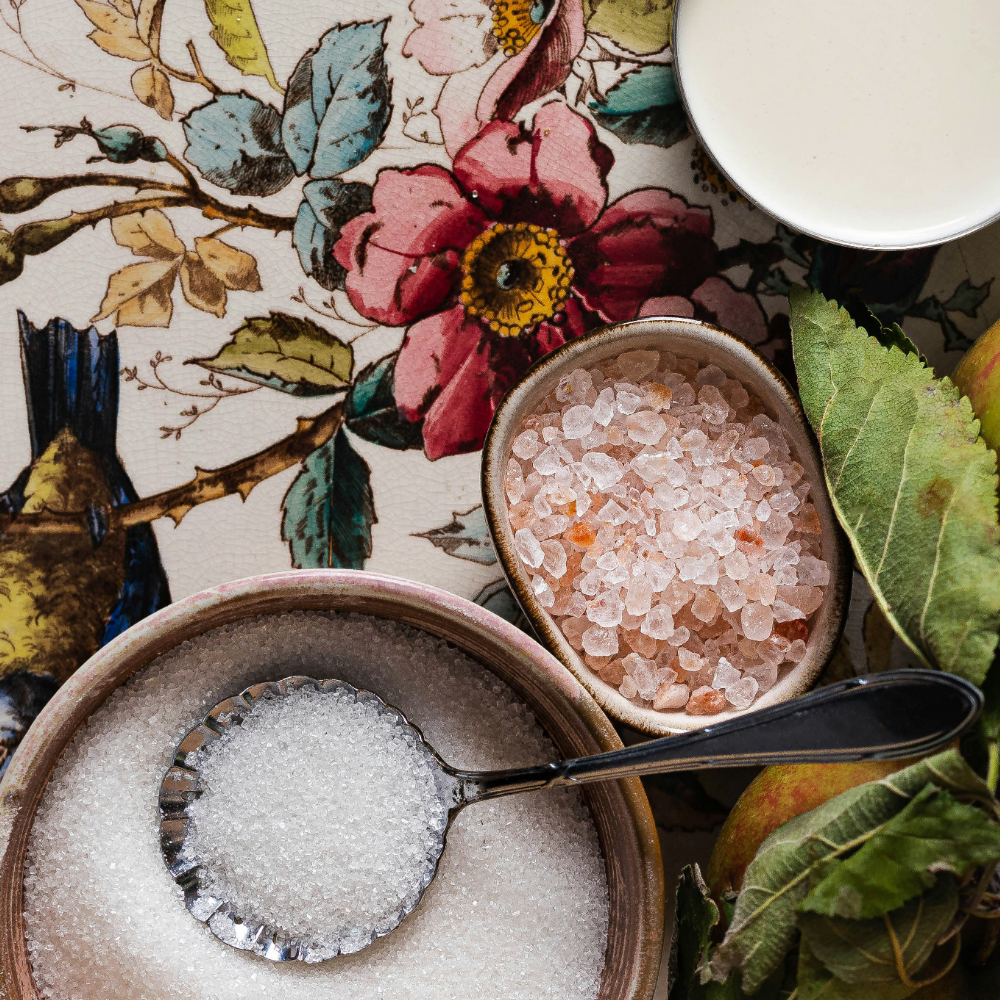
Key Takeaways
- Organic sugar is grown without synthetic pesticides, herbicides, or GMOs — a cleaner choice for people and the planet.
- It’s typically less processed, skipping chemical bleaching and retaining trace minerals and natural color.
- While not healthier nutritionally, organic and Fair Trade sugar support sustainable farming and fair labor practices.
Sugar is everywhere, baked into our favorite treats, swirled into morning coffee, and hiding in countless packaged foods. But when it comes to choosing the best kind, does organic actually make a difference?
Every year, the world produces nearly 186 million metric tons of sugar, mostly from sugarcane and sugar beets. But not all sugar is created equal — or grown the same way.
In this guide, we’ll unpack what makes organic sugar different, whether it’s worth the switch, and how to find ethical, sustainable brands that sweeten your day without souring the planet.
What Is Organic Sugar?
Organic sugar is still sugar at its core but how it’s grown and processed sets it apart from conventional options.
Unlike regular sugar, organic sugar comes from crops grown without synthetic pesticides, herbicides, or genetically modified organisms (GMOs). That means no chemical cocktails lingering in the soil or making their way into the final product. Instead, organic farmers use natural fertilizers, crop rotation, and other eco-friendly methods to keep their fields thriving.
The differences don’t stop at the farm. Organic sugar also skips some harsh processing steps used in conventional sugar production. It’s typically less refined, meaning it retains more of its natural color and trace minerals. Plus, it avoids chemical bleaching, a common practice that gives white sugar its pristine look but does nothing for its nutritional value.
Is Organic Sugar Better?
When it comes to sugar, “organic” doesn’t mean “healthy” but a different approach to how it’s grown and processed. So, is organic sugar actually better? That depends on what you’re comparing.
Farming Methods: A Cleaner Choice for the Planet
One of the biggest differences between organic and conventional sugar is how it’s grown. Organic sugar crops are farmed without synthetic pesticides, herbicides, or GMOs, which means fewer chemicals polluting the soil, waterways, and our food. Conventional sugar production, on the other hand, often relies on heavy pesticide use and environmentally damaging farming practices like burning sugarcane fields before harvest.
Processing: Less Refining, Fewer Additives
Most conventional sugar undergoes an intensive refining process, which often includes chemical bleaching and the use of additives to achieve that ultra-white, uniform look. Organic sugar skips those extra steps, meaning it’s typically less processed and free from chemical residues. It retains a more natural color—think light golden instead of stark white—and sometimes contains trace minerals from the original plant.
Taste and Texture: Can You Tell the Difference?
If you’re wondering whether organic sugar tastes different, the answer is… maybe. Organic cane sugar often has a slightly richer, more complex flavor than ultra-refined white sugar, which is stripped of its natural complexity to achieve pure sweetness. Texture-wise, organic varieties can be slightly coarser, but they dissolve just as easily in coffee, baking, or any other application where regular sugar is used.
But Let’s Be Real—Sugar Is Still Sugar
Here’s the thing: Organic sugar is still sugar. It’s not magically lower in calories, and your body processes it the same way as conventional sugar. The real benefits come from how it’s grown and processed not from any major nutritional boost. So, if you choose organic, do it for sustainability and cleaner production methods, not because it’s a “healthy” sugar alternative.
Is Organic Sugar Good for You?
Let’s immediately clear up a common misconception: organic sugar is still sugar. It doesn’t have magical health benefits and won’t turn your dessert into a superfood. But are there any real differences worth noting?
Nutritional Differences: Not Much to See Here
At a basic level, organic sugar and conventional sugar are nutritionally nearly identical. Both provide approximately four calories per gram, lacking significant amounts of vitamins, fiber, or protein. Since organic sugar is typically less processed, it might retain trace amounts of minerals like calcium or iron, but not enough to impact your diet.
The “Healthy Sugar” Myth
Just because something is organic doesn’t mean it’s healthy food. Organic sugar isn’t sugar-free, lower in calories, or metabolized differently by the body. Whether from organic sugarcane or a conventionally grown beet, your body still breaks it into glucose and fructose like regular sugar.
So, Is It “Good” for You?
Not really, but it’s not worse for you than regular sugar, either. The main advantages of organic sugar lie in how it’s grown and processed, rather than in any major nutritional benefits. If you’re choosing organic, do it for the environmental and ethical benefits, not because it’s a free pass to eat more cookies.
Sustainability and Ethical Considerations
Sugar might be sweet, but its production can have a bitter impact on the environment and farming communities. Conventional sugar farming is notorious for its heavy use of pesticides, deforestation, and unfair labor practices. Choosing organic and Fair Trade sugar isn’t just about what’s in your food; it’s about supporting a more ethical and sustainable system.
Environmental Impact: A Cleaner, Greener Choice
Organic sugar farming takes a more eco-friendly approach than conventional methods, which often rely on pesticides, synthetic fertilizers, and monocropping (growing the same crop repeatedly). Here’s how organic sugar makes a difference:
- Less pesticide runoff – No synthetic pesticides or herbicides means cleaner water systems, protecting marine life and reducing contamination in nearby communities.
- Healthier soil – Organic farming uses crop rotation, composting, and natural fertilizers, which help maintain soil fertility instead of depleting it.
- Biodiversity protection – By avoiding harsh chemicals, organic sugar farms create safer habitats for pollinators, birds, and other wildlife.
Conventional sugar production, particularly large-scale sugarcane farming, has led to deforestation in tropical regions like Brazil and Southeast Asia. When sugar fields expand, natural ecosystems shrink. Organic agriculture helps reduce this impact by promoting more sustainable land management practices.
Fair Trade Sugar: Ethical and Sustainable Farming
Beyond the environmental impact, the sugar industry has a long history of exploiting farmworkers, particularly in developing countries. That’s where fair trade sugar steps in to make a difference.
When you see the Fair-Trade certification on a bag of sugar, it signals that the farmers and workers are receiving fair wages, ensuring they aren’t underpaid for their hard work. It also means there’s a commitment to avoiding forced labor or child labor in production, which is sadly still a reality in many agricultural sectors.
Fair-trade certification also emphasizes sustainable farming practices that prioritize the environment’s health and workers’ well-being. By supporting Fair Trade sugar, you’re helping to empower small-scale farmers, offering them the financial security and resources they need to grow their businesses sustainably. So, when you choose Fair Trade sugar, you directly support those working under ethical, humane conditions.
How to Identify Ethical Sugar Brands
While it would be great if every product came with a handful of certifications, that’s not always the case. Each certification has its own set of standards, and a product may meet one set of criteria but fail to meet another. Plus, getting multiple certifications can be a costly and time-consuming process for producers.
When shopping for organic sugar, keep an eye out for these key certifications:
- USDA Organic: Guarantees the sugar is grown without synthetic pesticides, GMOs, or harmful chemicals.
- Fair Trade Certified: Ensures farmers and workers are paid fairly and work under ethical conditions.
- Rainforest Alliance: Focuses on sustainability, biodiversity, and fair labor standards.
- Non-GMO Project Verified: Confirms the sugar is free from genetically modified organisms.
- EU Organic: Similar to USDA Organic but follows European Union regulations.
- Demeter Biodynamic: Represents biodynamic farming methods, which go beyond organic practices.
- Fair for Life: Ensures fair trade practices, social responsibility, and environmental sustainability.
- Naturland: Adheres to rigorous organic and social standards.
Even if a product only has one or two certifications, it can still be a solid choice for supporting more ethical and sustainable practices. Look for the certifications that matter most to you and reflect your values.
6 of the Best Organic Sugars
1. Bakers Collection
$28
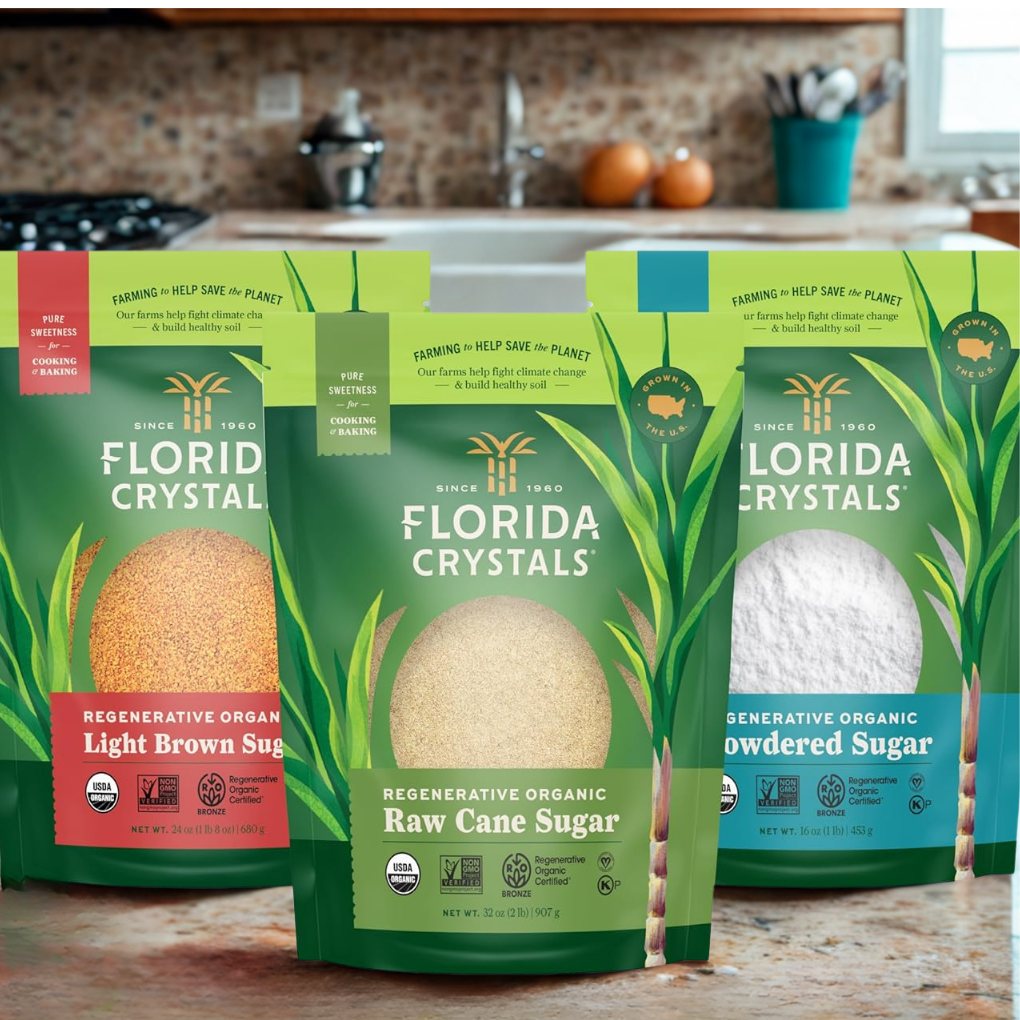
Florida Crystals is not your typical white sugar; the minimal processing means it retains its natural molasses content, giving it a beautiful golden color that makes everything look more appetizing.
They’re all about regenerative agriculture. This means adopting farming practices that heal the soil, boost biodiversity, and help sequester carbon in the atmosphere.
It’s not just about avoiding harmful chemicals they’re actively making the planet better. Plus, they use renewable energy in their production process, which is pretty impressive for a sugar company.
Certifications: USDA Organic, Non-GMO Project Verified, Vegan, Gluten-Free, Kosher, and supports regenerative agriculture practices
2. Cane Sugar
$22
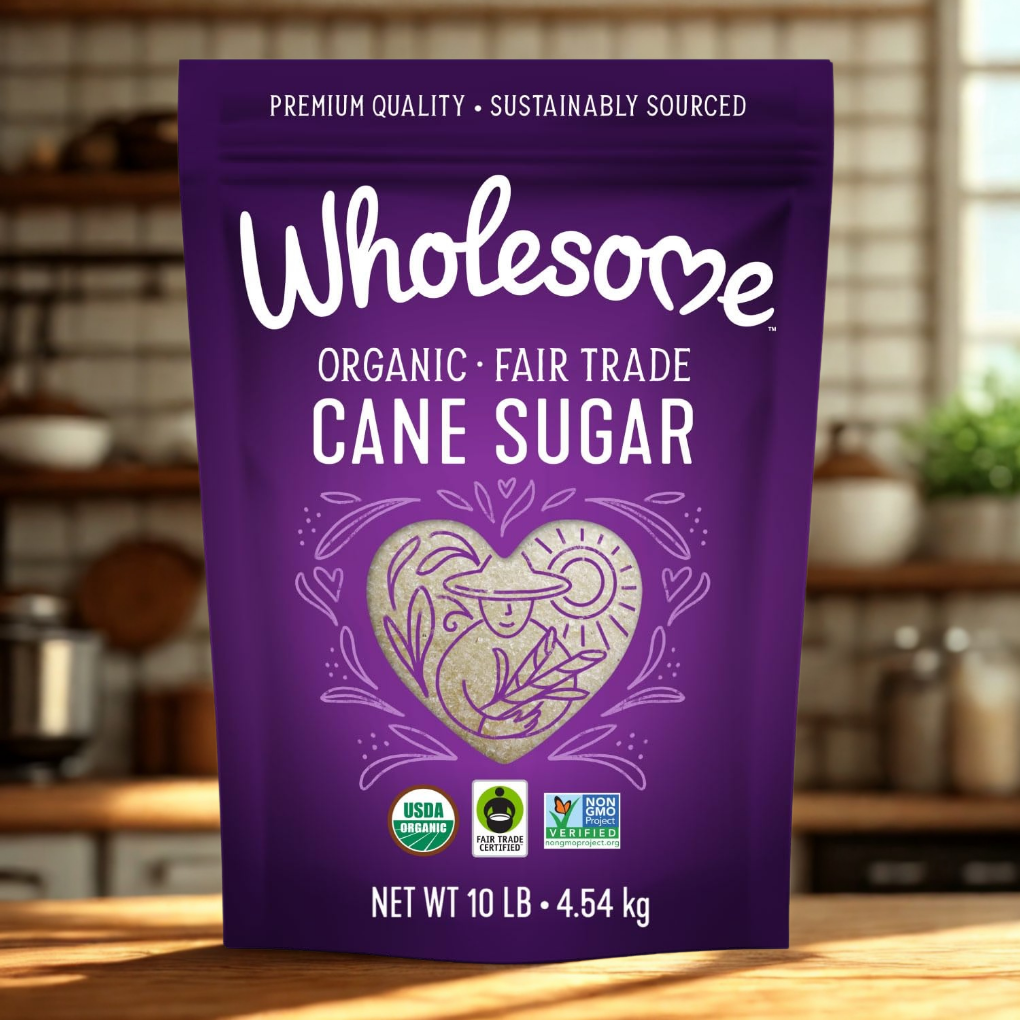
Wholesome Sweeteners focuses on doing things the right way from farm to table. This organic cane sugar comes from sustainably grown sugarcane in Central and South America, where the climate is perfect for producing high-quality cane.
The minimal processing keeps those beautiful blond crystals intact, along with just a hint of natural molasses that adds subtle warmth and depth compared to regular white sugar.
The Fair Trade certification means they’re actively partnering with farming communities to fund education, healthcare, and infrastructure projects. When you buy this sugar, you’re supporting real people and their communities, not just corporate profits.
Certifications: USDA Organic, Fair Trade Certified, Non-GMO Project Verified, Kosher Certified, Gluten-Free, Naturally Vegan
3. Coconut Sugar
$10
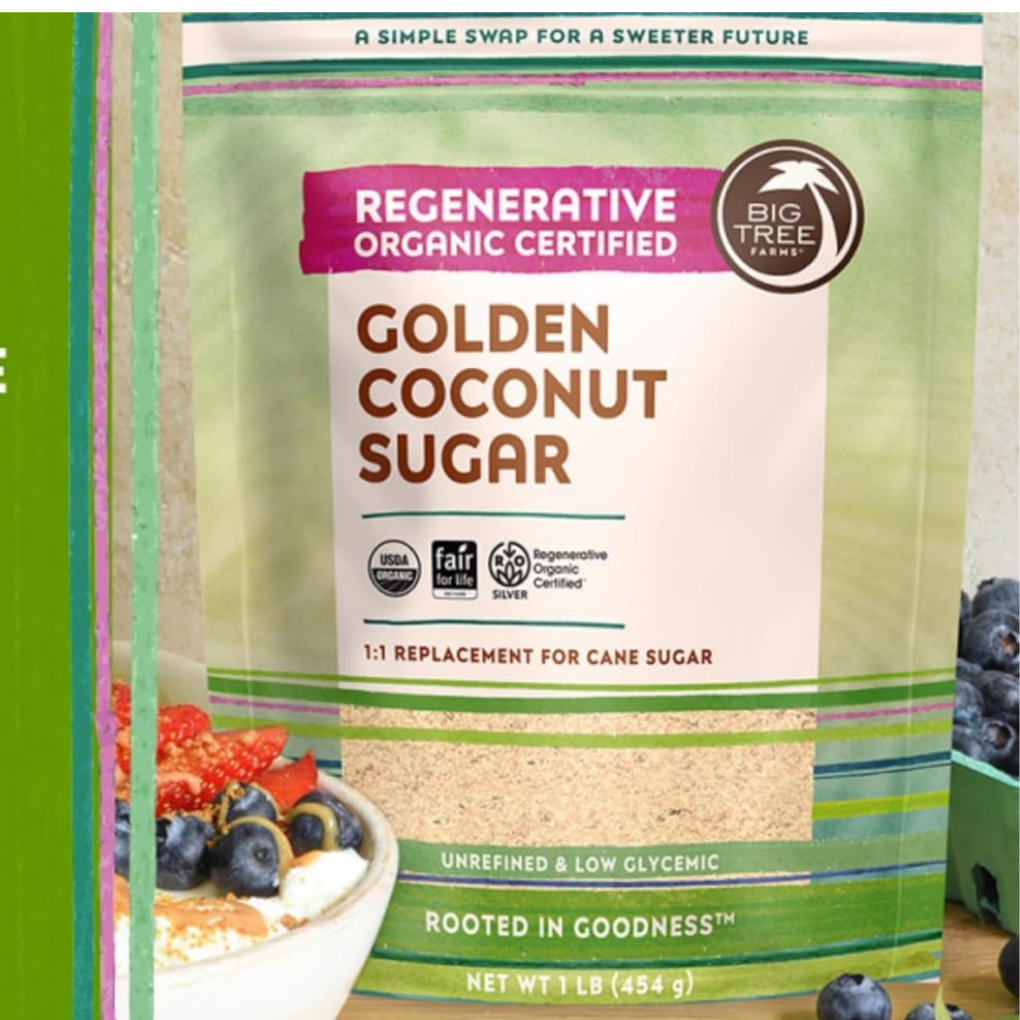
Big Tree Farms coconut sugar boasts a beautiful golden hue and a clean, light taste, making it a perfect 1-to-1 replacement for white cane sugar.
Made from pure coconut blossom nectar harvested by hand in Indonesia, this unrefined sweetener features fine crystals that dissolve quickly in beverages and blend seamlessly into recipes.
With its low glycemic index and rich amino acid content, it provides natural sweetness without the sugar crash, making it an ideal choice for health-conscious baking and cooking. The golden color enhances both sweet and savory dishes while delivering a deliciously clean flavor profile with no bitter aftertaste.
- Certifications: USDA Certified Organic,
Non-GMO Project Verified, Fair Trade Certified, Vegan
3. Date Sugar
$14

Date Lady’s Organic Date Sugar is a natural and wholesome alternative to refined sugar. It’s made from 100% organic whole dates that are dried and crushed.
Date sugar offers a wonderfully rich and earthy flavor, distinguishing it from ordinary white sugar. With its natural sweetness derived from whole dates, it adds a delightful taste similar to caramel and molasses to your recipes.
- Certifications: USDA Certified Organic,
Non-GMO Project Verified,
Vegan
3. Maple Sugar
$10

Experience the authentic taste of Vermont with Coombs Family Farms’ artisanal maple sugar, crafted by a seventh-generation family farm using time-honored traditions.
Made from 100% pure maple sap with no additives or fillers, this golden granulated sugar delivers the complex, nuanced flavor that only real maple can provide.
Unlike refined white sugar, it offers deep caramel undertones with subtle molasses notes and a rich, earthy sweetness that enhances both sweet and savory dishes.
- Certifications: USDA Certified Organic,
Non-GMO, Vegan
3. Beet Sugar
$12
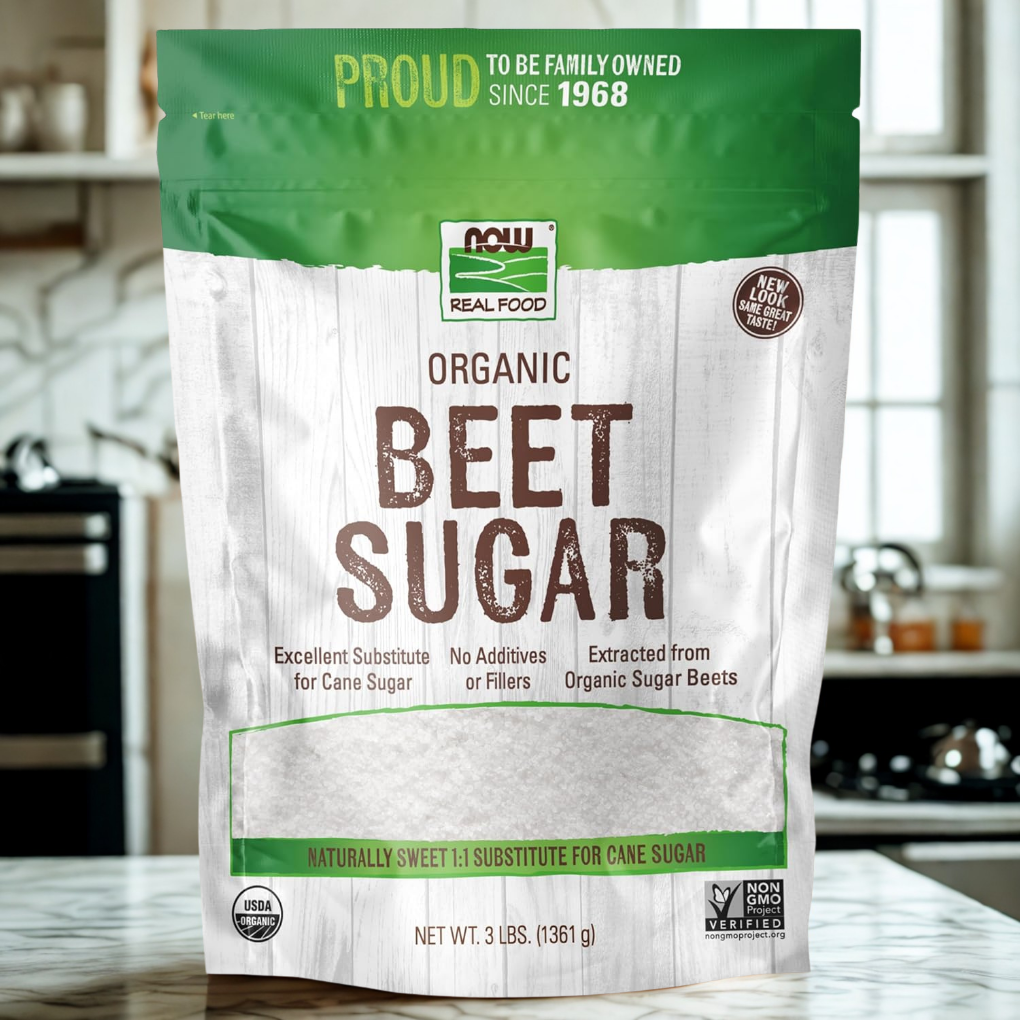
Before researching this article, I had never heard of beet sugar as an alternative to traditional cane sugar.
It turns out that the humble sugar beet, with its tough, rugged exterior, hides a sweet secret within. NOW Real Food has harnessed the natural sweetness of beets to create their beet sugar product.
These hardy root vegetables contain an impressive sugar content of up to 20% in their raw form, making them a valuable source for the production of refined sugar. The earthiness is much more pronounced in raw beets than in refined sugar.
- Certifications: USDA Certified Organic,
Non-GMO, Vegan
Other Organic and Natural Sweetener Products
Organic sugar isn’t the only way to add sweetness while staying mindful of health and sustainability. A variety of organic and natural sweeteners bring their own unique flavors, textures, and benefits to the table — giving you plenty of options beyond refined white sugar.
🍯 Organic Honey
Honey is one of the oldest sweeteners in the world, made naturally by bees from flower nectar. It adds a warm, floral sweetness and contains small amounts of antioxidants and trace minerals.
Because it’s less processed than refined sugar, honey can bring more complexity to your food and drinks. It’s great for sweetening tea, drizzling over yogurt, or using in baking for moisture and depth of flavor.
🌵 Organic Agave Nectar
Agave nectar comes from the sap of the blue agave plant. It’s thinner than honey and has a mild, caramel-like taste.
Many people like agave because it dissolves easily in cold liquids, making it perfect for iced coffee, smoothies, and cocktails. It also has a lower glycemic index than regular sugar, which means it’s less likely to cause rapid spikes in blood sugar.
🌾 Organic Molasses and Syrups
Molasses and natural syrups are thicker sweeteners known for their bold, earthy taste. They’re created during the sugar-making process and retain more of the minerals found in sugarcane.
Molasses can add richness to baked goods like gingerbread or cookies, while lighter syrups make an excellent topping for pancakes, oatmeal, or roasted vegetables. These sweeteners bring depth and warmth wherever you use them.
🍁 Maple Syrup and Maple Flakes
Maple syrup is made by boiling down the sap from maple trees into a golden, aromatic syrup. It delivers a deep, caramelized sweetness that pairs beautifully with breakfast foods, roasted nuts, or even coffee.
For a crunchy twist, maple flakes offer the same flavor in crystal form — perfect for sprinkling on top of desserts or fruit.
🧊 Zero-Calorie and Specialty Sweeteners
If you’re looking to reduce your sugar intake without giving up sweetness, natural zero-calorie options like allulose or stevia are increasingly popular. These plant-based or naturally derived sweeteners provide sweetness without calories or significant effects on blood sugar.
They can be used in drinks, yogurt, or baking, offering an easy swap for those who want to cut back on sugar without losing flavor.
How to Use Organic Sugar in Your Kitchen
Organic sugar can be used as a 1:1 substitute for conventional sugar in most recipes, but there are a few key nuances to consider for optimal results.
Common Uses for Organic Sugar
- Baking: Organic sugar performs excellently in cookies, cakes, and pastries. You may notice slightly different browning patterns due to the presence of trace minerals, which can enhance the flavor complexity in baked goods.
- Beverages: Perfect for sweetening coffee, tea, and homemade drinks. The subtle flavor differences are barely noticeable in most beverages, making it an easy swap.
- Preserves and Jams: Organic sugar works beautifully for canning and preserving. The natural properties help achieve proper gel consistency while maintaining the fruit’s natural flavors.
- Desserts: From caramel to meringues, organic sugar caramelizes nicely, though some bakers report that beet sugar creates a slightly crunchier texture in specific applications.
Performance Differences to Expect
- Caramelization: Organic cane sugar tends to caramelize more evenly than conventional sugar, while beet sugar may caramelize at slightly different rates due to its unique composition.
- Texture: In delicate recipes like macarons or fine pastries, you might notice minor textural differences. Most home bakers won’t detect these subtle changes.
- Color: Organic sugar may produce slightly deeper colors in baked goods due to the retention of trace minerals, which many consider a bonus for visual appeal.
- Dissolving: Organic sugar dissolves just as readily as conventional sugar in both hot and cold applications.
The bottom line? For everyday cooking and baking, organic sugar is a seamless substitute that may even enhance your results with its subtle complexity.
Buying and Sourcing Organic Sugar
When shopping for organic sugar, knowing what to look for and where to find the best options can save you money while ensuring quality.
What to Look For
Certifications: Always check for USDA Organic certification, which guarantees the sugar was produced without synthetic pesticides or herbicides. Look for additional certifications, such as Non-GMO Project Verified or Fair Trade, for extra assurance.
Source Information: Quality brands often specify whether their sugar comes from organically grown sugarcane or sugar beets, and may mention sustainably sourced practices.
Product Types: Beyond granulated sugars, consider organic alternatives like:
- Organic liquid sugar for beverages
- Organic syrups & molasses for baking
- Organic blue agave nectar as a liquid sweetener
- Organic fair trade honey for natural sweetness
Where to Buy
Bulk Options: Many health food stores and online retailers offer bulk organic sugar, which significantly reduces cost per pound. Co-ops and warehouse stores often have the best bulk pricing.
Specialty Suppliers: Natural food stores typically carry a wider variety of organic sugar types and can often special order specific brands or formats.
Online Retailers: Offer convenient access to specialty organic sugars and often provide bulk buying options with competitive pricing.
Cost Considerations
Bulk Buying: Purchasing larger quantities (5-25 lb bags) can reduce costs by 20-40% compared to small retail packages.
Seasonal Pricing: Sugar prices can fluctuate based on harvest seasons, so consider stocking up during sales.
Alternative Forms: Sometimes organic liquid sugar or syrups offer better value than granulated forms, especially for specific applications.
storage tips
Smart Storage for Long-Term Freshness
Organic sugar maintains its quality indefinitely when stored properly. Use airtight containers made of glass, food-grade plastic, or metal to prevent moisture absorption, which can cause clumping or hardening of the product. Store containers in a cool, dry pantry away from heat sources and direct sunlight.
For bulk purchases, consider dividing large quantities into smaller containers. Keep one for daily use and store the rest sealed until needed. This prevents repeatedly exposing your entire supply to air and moisture. Adding a food-safe desiccant packet to larger containers can provide extra protection in humid climates.
Since properly stored organic sugar has an indefinite shelf life, buying in bulk becomes a wise long-term investment that saves money without quality concerns.
This Has Been About the Best Organic Sugar
Organic sugar offers several advantages over conventional options. It’s produced without synthetic pesticides, herbicides, or fertilizers, which means fewer chemicals in the soil and water systems. The organic certification process also ensures better working conditions and fairer wages for farm workers.
From a health perspective, while organic sugar is still sugar nutritionally, it avoids potential pesticide residues found in conventional products. Environmentally, organic farming practices help preserve soil health and biodiversity.
However, moderation remains essential regardless of whether you choose organic or conventional sugar, as both have the same caloric and metabolic effects on your body.

